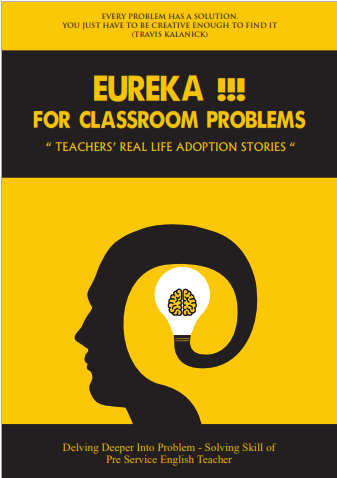Designing pedagogical narrative stories: Delving deeper into problem-solving skills of pre-service English teachers
DOI:
https://doi.org/10.21070/jees.v5i2.538Keywords:
PSETs, ADDIE model, problem-solving skillsAbstract
Educating Pre-Service English Teachers (PSETs) to be ready to face challenges is a response to the fast changing globalized world. Hence, preparing future teachers to apply problem-solving skills in dealing with teachers’ challenges in the classroom is necessary. This study was intended to design a set of pedagogical narrative stories which enquire problem-solving skills of PSETs. The pedagogical narrative stories were designed as a supplementary material in micro teaching class to help PSETs understand the complex issues of teaching and learning process. This study was based on ADDIE model. The designed material product consists of six units of teachers’ real life in adapted stories. Each unit contains critical discussion and reflective activities namely: Story, Individual Reflection, Group Sharing, Class Discussion and Resolution. The final product was validated by subject matter expert who has credibility in writing English learning books. The validated outcome showed that the supplementary materials are appropriate for PSETs in micro teaching class. The finding is projected to construct positive awareness on the importance of problem-solving skills to enhance PSETs’ competence in dealing with classroom problems by answering questions more critically and reflectively.
HIGHLIGHTS:
· Problem solving skills can support PSETs in dealing with unpredicted occurrences beyond mastering knowledge and teaching materials in class.
· Factual problems and guided reflections can provide PSETs with story engagement that is close to the real life of becoming teachers.
· Through reflective practices, PSETs have opportunities to evaluate and make meaning of their previous educational experiences to become decision makers.
Downloads
References
Aimah, S., & Ifadah, M. (2017). Building Teacher ’ s Pedagogical Competence and Teaching Improvement through Lesson Study. Arab World English Journal (AWEJ), 8(1), 66–78. https://doi.org/10.24093/awej/vol8no1.6
Barrows, H. S. (1985). How to design a problem-based curriculum for the pre-clinical years. In A taxonomy of problem-based learning methods (pp. 481–486). New York: Springer Publishing Company.
Branch, R. M. (2009). Instructional Design: The ADDIE Approach.
Cheung, L. (2016). Using the ADDIE Model of Instructional Design to Teach Chest Radiograph Interpretation. Journal of Biomedical Education, 2016, 1–6. https://doi.org/10.1155/2016/9502572
Delisle, R. (1997). How to use problem-based learning in the classroom. Virginia: Association for Supervision and Curriculum Development.
Fariyatul, E., & Bandono, A. (2017). The use of value clarification technique-based- picture story media as an alternative media to value education in primary school. Harmonia: Journal of Arts Research and Education, 17(1), 68. https://doi.org/10.15294/harmonia.v17i1.7469
Hakim, A. (2015). Contribution of Competence Teacher ( Pedagogical , Personality , Professional Competence and Social ) On the Performance of Learning. The International Journal of Engineering and Science (IJES), 4(2), 1–12.
Hsiu-Chih, S. (2008). The value of English picture story books. ELT Journal, 62(1), 47–55. https://doi.org/10.1093/elt/ccm077
Jonassen, D. H., & Hernandez-serrano, J. (2014). Case-Based Reasoning and Instructional Design : Using Stories to Support Problem Solving. ETR & D, 50(2), 65–77.
Juzwik, M. M., & Ives, D. (2017). Small Stories as Resources for Performing Teacher Identity. Narrative Inquiry, 1(2010), 37–61. https://doi.org/10.1075/ni.20.1.03juz
Kauchak, D., & Eggen, P. (1998). Learning and Teaching. Research-Based Methods (Sixth Edit). Boston: Allyn & Bacon.
Kemdikbud. (2020). Peta Jalan Pendidikan Indonesia. Retrieved from kemdikbud website: http://staffnew.uny.ac.id/upload/132304482/lainlain/buku-peta-jalan-pendidikan-indonesia.pdf
Lee, B., Riche, N. H., Isenberg, P., & Carpendale, S. (2015). More Than Telling a Story: Transforming Data into Visually Shared Stories. IEEE Computer Graphics and Applications, 35(5), 84–90. https://doi.org/10.1109/MCG.2015.99
Lichtman, M. (2012). Qualitative research in education: A user’s guide: A user’s guide. Sage.
Lozano, R., & Lozano, F. J. (2017). Connecting Competences and Pedagogical Approaches for Sustainable
Development in Higher Education : A Literature Review and Framework Proposal. Sustainability, 9, 1–15. https://doi.org/10.3390/su9101889
Rahman, M. H. (2014). Professional Competence , Pedagogical Competence and the Performance of Junior High School of Science Teachers. Journal of Education and Practice, 5(9), 75–80.
Ramlawati, Abdul Mun’im, & Yunus, S. R. (2018). Improving Pedagogical Competences of Prospective Science Teachers to Develop Learning Materials through Jigsaw Cooperative Model. 2nd International Conference on Statistics, Mathematics, Teaching, and Research, 1–7. https://doi.org/10.1088/1742-6596/1028/1/012209
Savin-Baden, M. (2003). Facilitating Problem-Based Learning: Illuminating Perspectives(First). Glasgow: The Society for Research into Higher Education and Open University Press.
Setiawan, A., Anggani, D., & Bharati, L. (2018). Developing HOT Project-Based-Speaking Assessment to Stimulate the Students ’ Critical Thinking and Creativity. English Education Journal, 8(3), 301–307.
Shenton, A. K. (2004). Strategies for Ensuring Trustworthiness in Qualitative Research Projects. Education for Information, 22, 63–75. https://doi.org/10.3233/EFI-2004-22201
Soleimani, N., & Razmjoo, A. (2016). Classroom Management Challenges : An Account of EFL Teachers at Private Language Institutes. Anatolian Journal of Education, 1(1), 51–69.
Yen, T. S., & Halili, S. H. (2015). Effective Teaching of Higher Order Thinking (HOT) in Education. The Online Journal of Distance Education and E-Learning, 3(2), 41–47.
Zahrani, B., & Elyas, T. (2017). The Implementation of Critical Thinking in a Saudi EFL Context : Challenges and Opportunities. Indonesian Journal of English Language Teaching and Applied Linguistics, 1(2), 133–142.

Published
How to Cite
Issue
Section
License
Copyright (c) 2020 Aprilia Arnis Ginting, Paulus Kuswandono

This work is licensed under a Creative Commons Attribution 4.0 International License.







